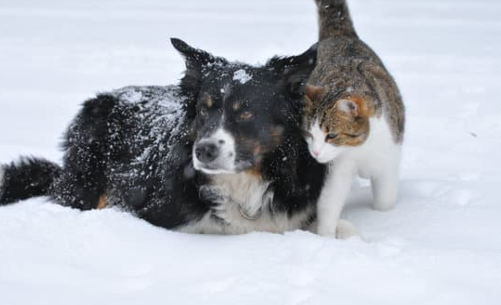
As winter settles in, it’s important to be mindful of the unique hazards that come with colder weather for our pets. While we bundle up in warm layers, our furry friends rely on us to protect them from winter’s chill and the dangers that accompany it.
At Bishop Ranch Veterinary Center, we want to ensure that both you and your pets stay safe and healthy this season. Here are some important cold weather hazards and tips to keep your pets protected:
1. Winter Paw Care: Protecting Those Paws from the Cold
One of the most common cold-weather concerns for pets is the health of their paws. Snow, ice, and salt can cause irritation, cracking, and even injury to your pet’s paws. Here's how to protect them:
Keep paws clean and dry: After walks in the snow or ice, wipe your pet’s paws with a warm, damp cloth to remove any salt, ice, or chemicals they may have picked up. Pay special attention to the area between their toes.
Use paw protection: Consider using booties to protect your pet's paws, especially if you’ll be walking them in icy or salted conditions. If your pet doesn’t like wearing them, you can use a paw balm to create a protective barrier.
Trim the hair between toes: For pets with long fur, trimming the hair around the paws can help prevent snow and ice from accumulating, which can cause discomfort or even injury.
2. Winter Toxins: Be Aware of Hidden Dangers
Winter brings with it a few specific toxins that can pose serious risks to pets if ingested. Keep an eye out for the following:
Antifreeze: Even a small amount of antifreeze can be deadly to pets. Antifreeze often has a sweet smell and taste that attracts animals, but it’s highly toxic. Make sure to clean up any spills immediately and store antifreeze in a secure area out of your pet’s reach.
Ice Melt & Salt: While helpful for preventing slips and falls on sidewalks, many de-icing products can be harmful to pets if ingested. These chemicals can cause stomach upset or irritation to your pet’s paws. Opt for pet-safe ice melt products when possible and be vigilant about wiping off your pet’s paws after walks.
Holiday Plants: Plants like poinsettias, holly, and mistletoe, commonly found around the holidays, can be toxic to pets. Keep these out of your pet’s reach and educate yourself on which plants can pose risks during the winter months.
3. Keep Your Pets Warm and Cozy
Just like us, pets can feel the effects of cold weather, especially if they have short coats or are older, sick, or very young. Here’s how to help them stay warm:
Indoor comfort: Ensure your pet has a warm, cozy place to rest indoors. Consider providing them with a soft bed or blanket in an area of the house that’s free from drafts.
Coats and sweaters: Some pets, especially small breeds or short-haired breeds like Chihuahuas and Greyhounds, may need extra warmth when outside. A properly fitted sweater or coat can help keep your pet comfortable during short outdoor excursions.
Never leave pets outside: It’s important to never leave your pet outside for extended periods during freezing temperatures. Even breeds that are accustomed to colder weather can suffer from frostbite or hypothermia if left outside too long.
4. Be Mindful of Winter Weight Gain
During the colder months, pets may be less active and more inclined to snuggle up indoors, which can lead to weight gain. Keep an eye on your pet’s body condition and ensure they’re getting the appropriate amount of food for their activity level. Regular playtime, even indoors, can help keep your pet active and prevent unwanted weight gain.
5. Keep Your Pets Hydrated
Even in the winter, hydration is important! Make sure your pet has access to fresh water at all times. During the colder months, pets may drink less, but it’s still crucial to encourage hydration for their overall health, particularly if they’re eating dry food or spending more time indoors in heated areas.
6. Monitor Your Pet’s Health
Cold weather can exacerbate certain health conditions like arthritis, respiratory issues, and skin problems. If your pet is showing signs of discomfort or changes in behavior, such as stiffness, coughing, or excessive shivering, it’s important to have them checked by a veterinarian.
Let’s Keep Your Pet Safe and Warm!
Winter brings many opportunities for fun and bonding with our pets, but it also presents unique challenges and risks. By following these cold weather tips, you can help ensure your pet stays safe, healthy, and happy throughout the season. If you have any concerns about your pet’s health this winter or need advice on keeping them safe during the colder months, don’t hesitate to reach out to us for advice. We’re here to help you keep your furry family members protected and comfortable all season long!







